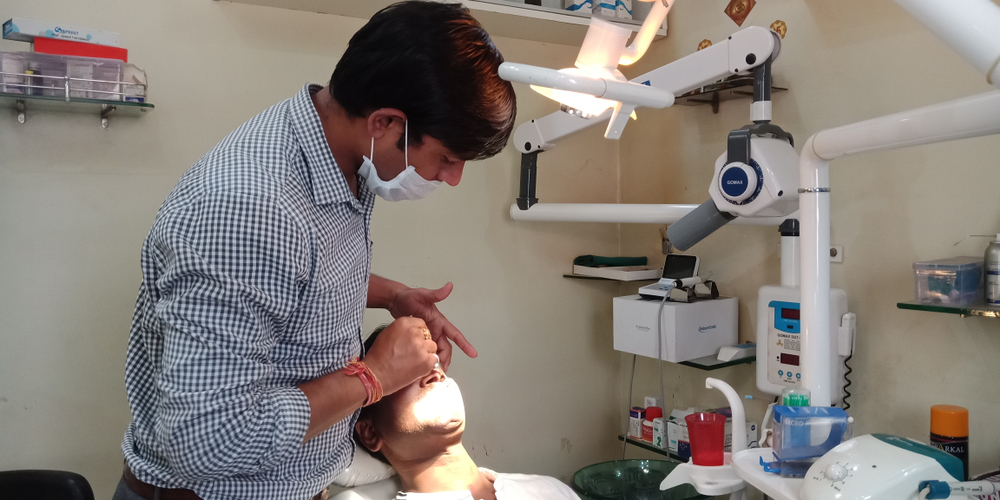Dental clinics in the Covid-19 containment zones will remain closed, however, they can continue to provide teleconsultation to patients, according to the guidelines issued by the Union health ministry for dental professionals in view of the ongoing pandemic.
Stating that dentists, auxiliaries as well as the patients undergoing dental procedures are at high risk of cross-infection as most dental procedures require a close contact with the patients' oral cavity, saliva, blood and respiratory tract secretions, the ministry has advised that all patients must be treated with due precautions.
'Saliva is rich in Coivid-19 viral load. Many patients who are asymptomatic may be carriers. For this reason, it is suggested that all patients visiting a dental office must be treated with due precautions,' it underlined.
According to the advisory, dental clinics will remain closed in the containment zones. However, they can continue to provide teleconsultation and the patients in these zones can seek ambulance services to travel to the nearby Covid dental facility.
Emergency dental procedures can be performed in the dental facilities falling under 'red' zones.
The dental clinics in the 'orange' and 'green' zones can provide consultancy, but such operations should be restricted to emergency and urgent treatment procedures only, the guidelines stated.
All routine and elective dental procedures should be deferred for a later review until new policy/guidelines are issued.
'Due to the high risk associated with the examination of the oral cavity, oral cancer screening under the National Cancer Screening programme should be deferred until new policy or guidelines are issued,' the ministry said.
The clinical conditions of dental origin, which require priority care but do not increase the patient's death risk, are categorised as 'urgent' and those increasing the patient's death risk are categorised as 'emergency', it said.
The guidelines were issued as the death toll due to Covid-19 rose to 3,163 and the number of cases crossed the one lakh-mark in the country on Tuesday.
Healthcare workers who are asymptomatic and do not fall under the category of being exposed to coronavirus infection are not required to undergo a test before resuming to work in the clinics.
According to the advisory issued by the ministry, all asymptomatic healthcare workers involved in the care of suspected or confirmed cases of Covid-19 are advised to take HCQ prophylaxis after medical consultation.
The ministry also outlined the guidelines for maintaining ventilation and air quality management in stand-alone dental clinics.
It suggested maintaining air circulation with natural air through a frequent opening of windows and using an independent exhaust blower to extract the room air into the atmosphere.
According to the guidelines, use of a ceiling fan while performing a procedure should be avoided, a table fan should be placed behind the operator to let the airflow towards the patient. A strong exhaust fan should be so located to create a unidirectional flow of air away from the patient.
The air-conditioners should be frequently serviced and the filters cleaned.
In centrally air-conditioned buildings, blocking off the return air vents in the patient area will temporarily stop air circulation, provided the AHU has a provision to receive adequate outdoor air supply. 'Allow fresh air into rooms by opening of windows or doors slightly,' the guidelines stated.
Visual alerts should be displayed at the entrance of the facility and in strategic areas (waiting areas, elevators) about respiratory hygiene, cough etiquette, social distancing and disposal of contaminated items in trash cans.
'Ensure availability of sufficient three-layer masks and sanitisers and paper tissue at the registration desk, as well as nearby hand hygiene stations. Distant waiting chairs, preferably a metre apart,' the guidelines said.
The guidelines suggested that the patients should not wear a wristwatch, hand and body jewellery and carry additional accessories and bags, and use their own washrooms at home to avoid the need of using toilets at the dental facility. They should also wear a mask.
As far as the protocols of patient handling in the clinic area is concerned, for appointments that do not result in aerosols and need examination, doctors can only wear a triple-layer surgical mask and protective eyewear/face shield along with gloves.
'Wear N95 face masks, protective eyewear/face shields and gloves along with coverall for high-risk and very-high-risk procedures. To increase the shelf life of N95 masks, you may cover them with a surgical mask and discard only the surgical mask after use,' the guidelines stated.
When examining patients with moderate risks, the doctor will require all PPE except that the coveralls can be substituted with surgical gowns, it said.










